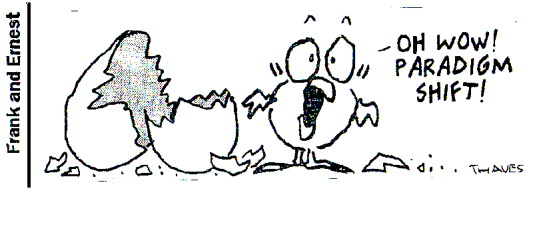My fiancé studies ExPhil and perspectives on learning and technology this semester, and I simply wonder what paradigm are we in?
From Koschmann, T.: Paradigm Shifts and Instructional technolgy. An introduction 1996. New Jersey: Lawrence Erlbaum Associates Publishers (who reference like that nowadays anyway? Scientists. Periode.) it is written this about Paradigms:
Kuhn theorized in 1972 that scientific research proceeds through long, relatively stable periods of normal science intermittently punctuated by briefer, more tumultuous times in which new paradigms for research may emerge. He charachterized normal science as “research firmly based upon one or more past scientific achievements, achievements that some particular scientific community acknowledges for a time as supplying the foundation for its further practice.
I have long since predicted a massive change in the entire academic world around this. Due to the Internet, information spreads faster and faster. Things change faster and faster, and I can not understand how academia can withstand this ever increasing change spead much longer. They still refer to scientific articles and journals. They still get compensated to publish in journals. While the entire rest of the world just googles, reads, learns and accepts and not to mention blogs, tweets and discuss online!
So my question is, what kind of paradigm are we in? About time some scientists hatch?

I think you touch on some highly relevant issues. If we operate under a false paradigm (a map that is not aligned with the territory), our understanding of phenomena will be severely distorted. However, scientific findings needs to be replicated in order to be confirmed. Only so, we can make sound conclusion. This is why it has to take some time.
They key lies in being both thorough AND efficient. Sometimes the system (publication of journals etc.) may seem to work against us. But we can choose to react differently to this, by using other channels (media, twitter, facebook) to spread the word. But this presupposes we are really onto something. And can we know whether this is the case without testing our hypotheses scientifically? After all, we do not want to introduce a new, distorted map of the territory.
Conclusion? There is a balance in everything. Especially between being thorough and being efficient!
“Nur Das Beste Order Nichts”
– Gottlieb Daimler
I think Gøran has a point when it comes to how people are being made aware of research, but do note these cases:
– Daily Mail reporting that the earth is cooling. Which is ridiculous.
– Bill O’Reilly claiming no one could explain why we have tides.
– Media hype over vaccinations “causing autism”
Scientists are worried – and in my view with good reasons – that information being released will be misinterpreted by people not able to understand the scientific language necessary for a clear, concise scientific paper.
The peer review process is essential to the current scientific method and publication, and attempts at an “open marketplace of ideas” where papers are published without peer review has lead to groups like the Discovery Institute publishing loads of absolute rubbish so-called “scientific” papers on those sites. Papers with little or no scientific accuracy.
I am not sure the “paradigm” view is correct, though. There are discoveries made weekly in science today which would make Koschmann faint in excitement. It’s all about perspective: If there are major discoveries in science every day, how are they “special”?
A few major science events from 2012:
– Higgs Boson discovered
– Full genome mapping of a human fetus
– Curiosity lands on Mars.
– 50 mile quantum teleportation
And a few from this year:
– Negative temperature (in Kelvin!) gas
– Image of a galaxy 10 billion light years away taken by Hubble.
– Cornell University creates a functioning artificial ear with a 3D printer.
– First ever brain-to-brain interface on rats.
Any of these should be considered a significant breakthrough, yet they are “just one of many” – all of them.
And I think this is where we get to the heart of the issue: It’s no longer a matter of paradigms. We’re in a time of constant scientific discovery. What would have been seen as a completely unbelievable discovery 30 years ago is now something which happens every day.
You might then say that we are in a paradigm of extreme scientific discovery, but then I would – again – protest. If paradigms should exist as a concept, it should – in my humble opinion – be describing sociological and/or cultural development; how good is society at letting science rule itself?
The paradigms Koschmann describes coincide strangely with the periods in which society did not kill you for making a discovery. Those paradigms are therefore not, in my view, something inherent in science, but rather an indication on societ’s willingness to let science thrive. It can be argued that “this is what Koschmann means” or “it doesn’t matter WHAT the reason is, just THAT it is like this”, but that’s not true; in Koshmann’s version, this is something inherent in science, and as such it’s not something one can really control if you wish. In my opinion, he is dead wrong. It can be “controlled” by allowing science to do what it does best: Discover.
As for your point about communicating their finds to the public, well….See the third paragraph, then think of this headline:
“Breaking discovery! First direct brain link created by UK scientists!”
Then think about the 9/11 truthers, NWO conspiracy “theorists” etc. There’s a reason why they are careful.
And besides, these discoveries will be made – and applied – without the need for public hysteria about each and every discovery. Science will always discover. All we need to do is give them the chance.
– S